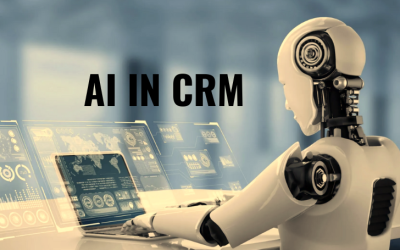Customer relationship management, or CRM, is the cornerstone of any effective marketing plan in the modern digital era. CRM solutions help companies manage and grow their relationships with customers, which increases revenue and cultivates a loyal customer base. CRM systems have advanced significantly as a result of artificial intelligence (AI), providing organizations with previously unthinkable levels of automation and insightful data.
AI’s Potential in CRM
Artificial intelligence has completely changed how companies communicate with their clientele. CRM systems with AI capabilities can examine enormous volumes of data, find trends, and offer useful insights. Thanks to technology, businesses can now provide personalized and targeted marketing campaigns, improving customer engagement and increasing sales.
Microsoft CRM development has become a powerful force in the CRM market by using AI to improve its Dynamics 365 platform. Businesses may now leverage AI’s potential for marketing in some ways by integrating AI-driven features.
1. Targeting and segmenting customers
Among the key benefits of AI for CRM is its efficient customer segmentation. AI algorithms can segment customers according to their demographics, preferences, and behavior. AI-powered Microsoft CRM development allows companies to define highly specific client categories.
It is possible to create hyper-targeted marketing campaigns with this level of detail. Companies can increase the relevance and efficacy of their marketing campaigns by customizing their messaging to target specific client segments.
2. Analytics Predictive
Another area where AI-powered CRM excels is predictive analytics. Artificial Intelligence (AI) algorithms are used in Microsoft CRM development to predict client actions and outcomes. AI can predict which leads are more likely to convert, which products a customer might be interested in, and even when a client is likely to purchase by evaluating prior data.
These insights enable marketers to prioritize leads with a higher chance of conversion, make data-driven decisions, and allocate resources more effectively.
3. Individualization at Measure
Effective marketing is largely based on personalization. CRM systems with AI capabilities, like Microsoft’s, allow companies to offer tailored content and suggestions at scale. CRM platforms can provide content or product suggestions based on an individual’s past interactions and preferences thanks to AI-driven algorithms. In addition to improving the consumer experience, this degree of customization raises conversion and retention rates.
4. Automating Daily Jobs
CRM with AI capabilities can automate tedious jobs, allowing marketers to concentrate on more strategic endeavors. Data input, lead scoring, and email marketing are examples of tasks that can be automated to save time and reduce the chance of human error.
AI-driven chatbots and virtual assistants are part of Microsoft CRM development; they may interact with clients in real-time, respond to frequently asked questions, and offer assistance. It simplifies marketing processes and improves customer service.
Developing Microsoft CRM with AI-powered Dynamics 365

Microsoft’s Dynamics 365 platform demonstrates its dedication to the advancement of AI and CRM. Dynamics 365 is a flexible CRM system that effectively incorporates AI features, making it an effective tool for successful marketing campaigns.
1. Sales Dynamics 365 AI
One part of Microsoft’s CRM development that leverages AI to improve the sales process is Dynamics 365 AI for Sales. It helps sales teams find and rank prospects, forecast when deals will close, and automate administrative work.
Microsoft CRM development includes AI-driven chatbots and virtual assistants that may assist, answer frequently asked questions, and engage with clients in real time. Processes related to marketing are made simpler, and customer support is enhanced.
2. AI-Powered Microsoft CRM Development Excel 365
Microsoft’s commitment to the development of AI and CRM is reflected in the Dynamics 365 platform. Dynamics 365 is a versatile CRM system that successfully utilizes AI features, making it a useful tool for successful marketing efforts.
3. Dynamics 365 Marketing
Microsoft’s Dynamics 365 Marketing module is designed to provide a full range of capabilities for organizing, executing, and evaluating marketing initiatives. Businesses can gain real-time insights into the success of their marketing campaigns with AI-powered analytics.
The module’s ability to analyze how customers interact with marketing content allows companies to quickly modify their tactics and maximize outcomes. Additionally, AI can assist in determining the best methods for engaging customers.
Thinking About Implementation Issues And Things
Despite the many potential benefits of AI-powered CRM for marketing, there are some implementation-related issues and concerns that companies should consider.
1. Privacy and Data Quality
Data is the foundation of AI, so data quality is critical. Companies need to ensure that the CRM data they have is accurate, current, and compliant with data protection laws such as GDPR. With an AI-powered CRM, data security and privacy are crucial, and businesses must have robust safeguards in place to protect client information.
2. Coordination and Instruction
Integrating AI-powered CRM with existing systems can be difficult. Microsoft CRM development may require integration with other business tools and customization. Staff members may also need training to fully utilize AI-powered capabilities.
3. ROI Calculation
Calculating the return on investment (ROI) for CRM powered by AI can be difficult. Even if the benefits are clear, determining how AI directly impacts marketing tactics may require the use of complex analysis tools.
Conclusion
AI-powered CRM has completely changed the marketing strategy landscape, with a special emphasis on Microsoft CRM development. Businesses can now predict customer behavior, automate repetitive operations, and develop highly personalized and effective marketing campaigns by integrating AI into CRM. Organizations can harness these possibilities using the robust toolkit offered by Microsoft’s AI-enhanced Dynamics 365 platform.
Businesses need to address issues with data quality, integration, and ROI measurement, as they move to deploy AI-powered CRM. Nonetheless, AI in CRM has indisputable advantages, making it a vital component of effective marketing plans in the digital age. By implementing an AI-powered CRM, businesses can improve sales, strengthen client relationships, and thrive in an increasingly cutthroat industry.







